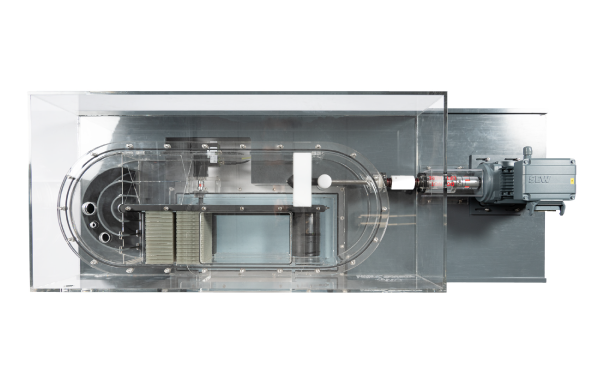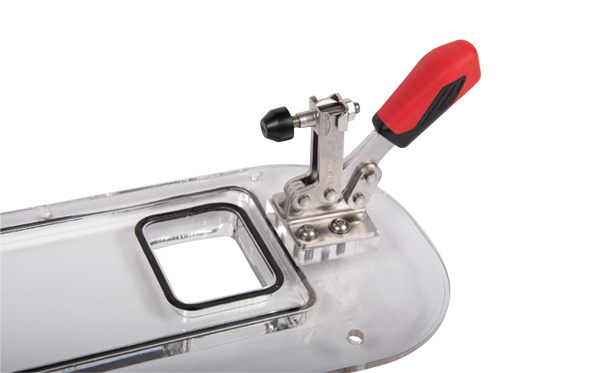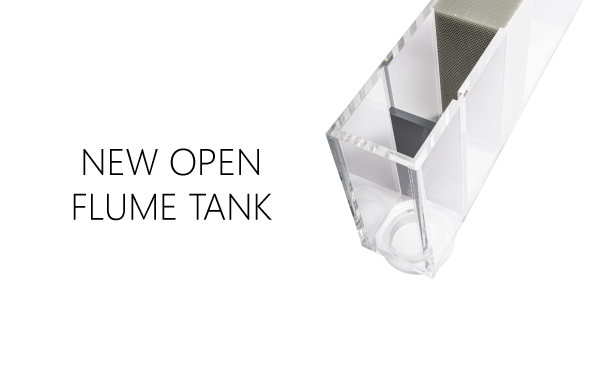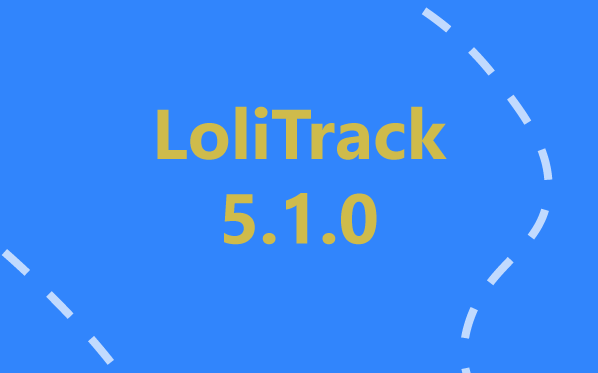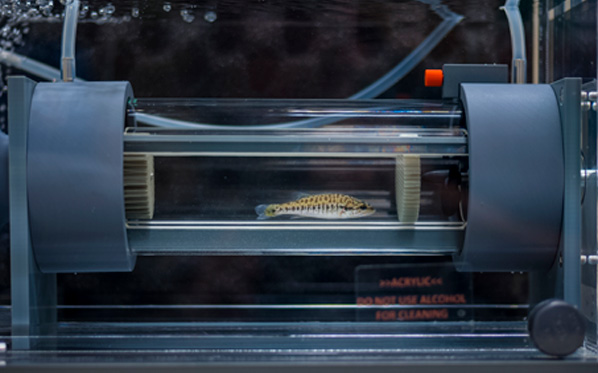News
Wed, May 05 2021
New treadmill swim tunnel for walking fish or invertebrates
A new modified version of our 30 L swim tunnel, with a motorized transparent belt that can be operated independently of the water flow, is now available.
We call it a Treadmill Swim Tunnel, and you can use it to force-exercise walking fish like rays or gurnards, crustaceans like crayfish or lobster, and other benthic animals at various speeds.
The moving floor is made from transparent food-grade rubber material allowing filming from below, and the planar lid and wall surrounding the test section also allows for filming/viewing from the top and left side.
The water flow can be adjusted independently from 5-175 cm/sec as for our standard 30 L swim tunnel, by means of a second motor and control box.
Tue, Mar 02 2021
Fish Swimming Course - Summer 2021
If you are an early-career researcher (graduate student or postdoc) interested in fish locomotion and ecophysiology, do not miss this great opportunity. Applications will be accepted for two more weeks (until mid-March 2021).
Friday Harbor Labs are offering a Fish Swimming course taught by Paolo Domenici, John Steffensen and Jacob Johansen for graduate students and postdocs between July 19th and August 20th, 2021.
For more information (including tuition and financial aid) go to: https://fhl.uw.edu/courses/course-descriptions/course/fish-swimming-kinematics-ecomorphology-behavior-and-environmental-physiology-2/
See also: https://fhl.uw.edu/courses/applying-for-an-fhl-course
Applications will be accepted during the first two weeks of March 2021. Early applications are encouraged, and financial aid is available to students from all countries.
For more information, contact paolo.domenici@cnr.it, jfsteffensen@bio.ku.dk or jacob.l.johansen@gmail.com.
Mon, Feb 22 2021
New PCR film for sealing microplates
Based on positive user feedback, we recommend using PCR film, rather than parafilm, to seal our glass microplates when used for closed respirometry. The PCR sealing film that we now offer is a self-sticking clear polyester sheet that simply sticks onto the glass microplate providing a water-tight seal minimizing sample evaporation and contamination.
Watch this tutorial on how to apply the PCR film:
Mon, Jan 18 2021
New quick release lid
Inspired by feedback from the famous Poss Lab at Duke University, we are now offering a new quick release lid for our 5 L and 10 L swim tunnels for fast and effortless addition/removal of animals. This is especially relevant for users that are force-exercising large groups of zebrafish and want to get the fatigued specimens out in no time and without disturbing the rest of the fish or having to stop the experiment.
The lid opening is placed right next to the downstream grid where fatigued fish tend to end up during swimming performance tests. This means that if one or multiple animals get stuck on the grid during swimming, the animals can be quickly removed without having to unscrew the entire lid.
Tue, Jan 05 2021
DPTV 2 complete video tutorial
We have created the complete video tutorial for our new DPTV 2 software. The video shows how easy it is to perform an automated water velocity calibration in one of our mini swim tunnels using a uEye camera and a DAQ-BT device, and how you can perform a manual calibration as well as record your own videos.
We hope you like it. Feel free to contact us if you have any questions or want to know more about the DPTV 2 software.
Tue, Dec 01 2020
DPTV 2 quick video tutorial
We have created a quick video tutorial for our new DPTV 2 software. The short video shows how easy it is to perform an automated water velocity calibration in one of our mini swim tunnels using a uEye camera and a DAQ-BT device.
We hope you like it. Feel free to contact us if you have any questions or want to know more about the DPTV 2 software.
Fri, Oct 09 2020
New open flume tank
We have introduced a new product to our portfolio.
This Open flume tank is for force-swimming individual or groups of fry-juvenile zebrafish; or anything aquatic and similar sized, for that matter. This system is ideal for zebrafish phenotyping, swimming performance, exercise physiology, behavior etc. in freshwater or seawater species. The water velocity (= swimming speed) can be adjusted using the included diaphragm valve and paddlewheel flow sensor, and can be adjusted from 2-28 cm/s. The tank has an open test section meaning that introducing, accessing, and removing the animal is a breeze. The section provides a clear view (e.g., for filming) from four angles (left, right, above and below). It is also possible to adjust the water depth by switching between the included weirs.
The open flume tank was developed with versatility and high-throughput in mind.
Thu, Sept 24 2020
NEW LoliTrack 5 update
A new updated LoliTrack version 5.1.0 is now available and free to download and install for all LoliTrack 5.x.x users: https://loligosystems.com/downloads
New features include:
- The distance from animal(s) to center of zone(s) can be logged and exported.
- % of time spend in zone(s) can be logged an exported.
- Masks can be individually saved and loaded.
- Zones have the same look-and-feel as masks and can now be rotated.
- Arrow keys can be used to scroll on the timeline.
- Duration of selected timeline intervals are now shown.
Minor bug fixes:
- Timeline fixed to behave correctly with respect to frame rate.
- Microplate object tracking ‘escapes' from the wells have been fixed.
- When changing frame rates of uEye cameras, the pixel clock is set to the highest possible.
- 3D Excel exported frames without data are now exported with empty fields.
- Fixed an issue where pop-up windows would slow down or crash the software.
- Improved speed of object auto-selection of multiple objects.
- Improved camera communication.
Wed, Sept 16 2020
CASE at UNT: Like a treadmill for fish
One of the products we offer is a swim tunnel for aquatic animals. It is “like a treadmill for fish”, we usually answer, when asked what a swim tunnel is for. But what is a swim tunnel actually used for?
A good example is found in a recent press release featuring UNT professor, Ed Mager. The press release describes why Ed and his team’s research on four species of Guadalupe River fish is important. Ed explains that:
“Once we understand the swimming performance of the river’s occupants, we can make recommendations of maximum water flow rates that can be incorporated into the planning of waterway crossings.”
In other words, the research team use one of our swim tunnels to examine the maximum sustained velocity and burst speed of the Guadalupe Bass (the state fish of Texas), Guadalupe Roundnose Minnow, Guadalupe Darter and Plateau Shiner that all inhabit the river at various life stages. The Loligo swim tunnel (see picture above) enables the team to swim the fish at different water velocities in a fully controlled environment while they are able to automatically measure their oxygen consumption rate, at the same time. The setup further allows accurate control of temperature, and the option to film the swimming fish from different angles, if needed.
Overall, you may find a swim tunnel used in physiology studies and in research on energetics, behavior, biomechanics and kinematics – not only in fish, but essentially in any aquatic animals that meet the physical requirements of the swim tunnel.
